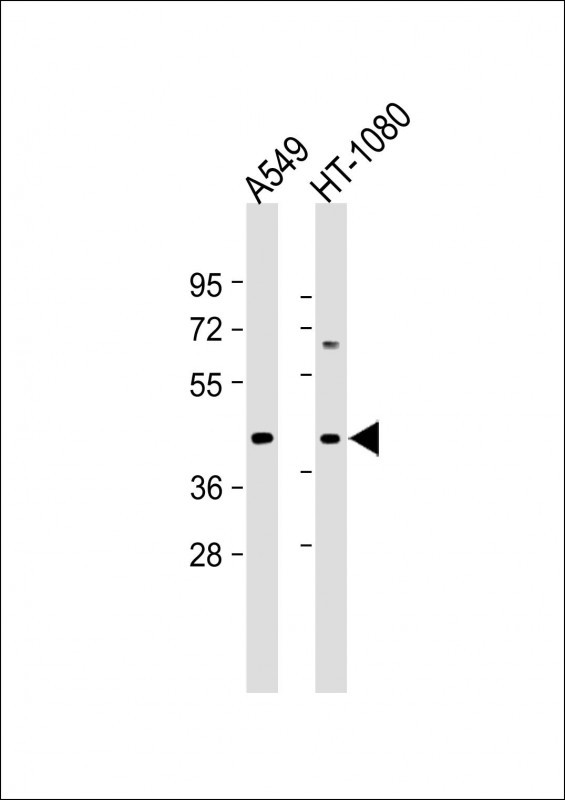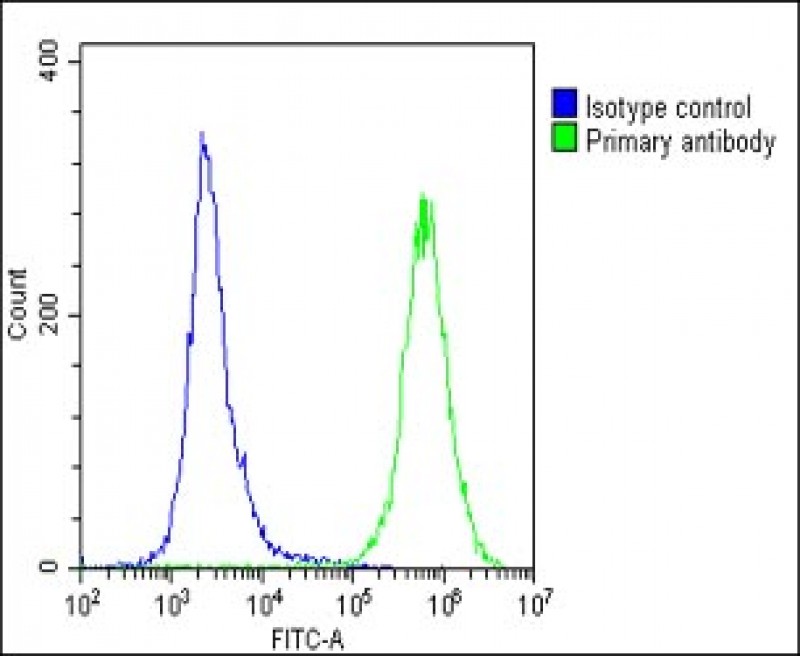

| WB | 1/2000 | Human,Mouse,Rat |
| IF | 咨询技术 | Human,Mouse,Rat |
| IHC | 咨询技术 | Human,Mouse,Rat |
| ICC | 技术咨询 | Human,Mouse,Rat |
| FCM | 1/25 | Human,Mouse,Rat |
| Elisa | 咨询技术 | Human,Mouse,Rat |
| Aliases | Double homeobox protein 4 {ECO:0000312|HGNC:HGNC:50800}, Double homeobox protein 10 {ECO:0000312|EMBL:AAK915091}, DUX4 (HGNC:50800), DUX10 |
| Entrez GeneID | 100288687 |
| WB Predicted band size | 44.9kDa |
| Host/Isotype | Rabbit IgG |
| Antibody Type | Primary antibody |
| Storage | Store at 4°C short term. Aliquot and store at -20°C long term. Avoid freeze/thaw cycles. |
| Species Reactivity | Human |
| Immunogen | This DUX4 antibody is generated from rabbits immunized with a KLH conjugated synthetic peptide between 376-404 amino acids from the C-terminal region of human DUX4. |
| Formulation | Purified antibody in PBS with 0.05% sodium azide. |
+ +
以下是3-4条关于DUX4抗体的参考文献及简要摘要内容:
1. **文献名称**:*"A Specific DUX4 Antibody for the Study of FSHD-Associated Pathology*"
**作者**:Haynes, P. 等(2017)
**摘要**:开发了一种特异性抗DUX4的单克隆抗体,用于检测面肩肱型肌营养不良症(FSHD)患者肌肉活检中的DUX4蛋白表达,验证了其在细胞模型和患者组织中的敏感性。
2. **文献名称**:*"Characterization of DUX4 Antibodies for Immunofluorescence and Western Blotting*"
**作者**:Geng, L.N. 等(2012)
**摘要**:通过免疫荧光和Western blot技术验证了多种DUX4抗体的特异性,发现部分抗体可识别内源性DUX4蛋白,并揭示了其在肌细胞分化中的短暂表达模式。
3. **文献名称**:*"DUX4 Immunodetection in FSHD Muscle Biopsies: Technical Challenges and Comparative Analysis*"
**作者**:Tassin, A. 等(2013)
**摘要**:比较了不同DUX4抗体的灵敏度和特异性,指出检测DUX4蛋白的难点(如低表达量和短半衰期),并提出优化实验流程的建议。
4. **文献名称**:*"Therapeutic Targeting of DUX4 in FSHD: Antibody Validation in Preclinical Models*"
**作者**:Rickard, A.M. 等(2015)
**摘要**:利用抗DUX4抗体评估基因沉默疗法对DUX4表达的抑制效果,证明了抗体在监测治疗反应中的实用性。
(注:以上文献信息为示例,实际引用需核实具体论文标题、作者及发表年份。)
DUX4 antibodies are essential tools in studying the pathogenesis of facioscapulohumeral muscular dystrophy (FSHD), a genetic muscle disorder. DUX4 (double homeobox 4) is a transcription factor encoded by a retrotransposed gene in the D4Z4 macrosatellite repeat on chromosome 4. Normally, DUX4 is epigenetically silenced in somatic tissues, with transient expression restricted to early embryogenesis and germline cells. In FSHD, however, partial deletion of D4Z4 repeats or chromatin relaxation due to mutations leads to aberrant DUX4 expression in skeletal muscle. This ectopic DUX4 activates pathogenic pathways, including muscle atrophy and inflammation, driving disease progression.
DUX4 antibodies are designed to detect endogenous DUX4 protein, which is challenging due to its extremely low abundance in FSHD-affected tissues. Commonly used monoclonal clones, such as E5-5 and 9A12. target distinct epitopes (N-terminal or C-terminal regions) to enhance specificity. These antibodies enable applications like Western blotting, immunofluorescence, and immunohistochemistry to visualize DUX4 localization and quantify its expression in cellular or animal models. Commercially available antibodies (e.g., from MilliporeSigma, Santa Cruz Biotechnology) have become critical for validating DUX4-targeting therapies, including RNA interference or small-molecule inhibitors. However, variability in antibody performance and cross-reactivity with other proteins (e.g., DUX4 splice variants or homologs like DUXA) necessitate rigorous validation using knockout controls. Ongoing research focuses on improving antibody sensitivity and developing standardized protocols to address technical limitations in DUX4 detection.
×